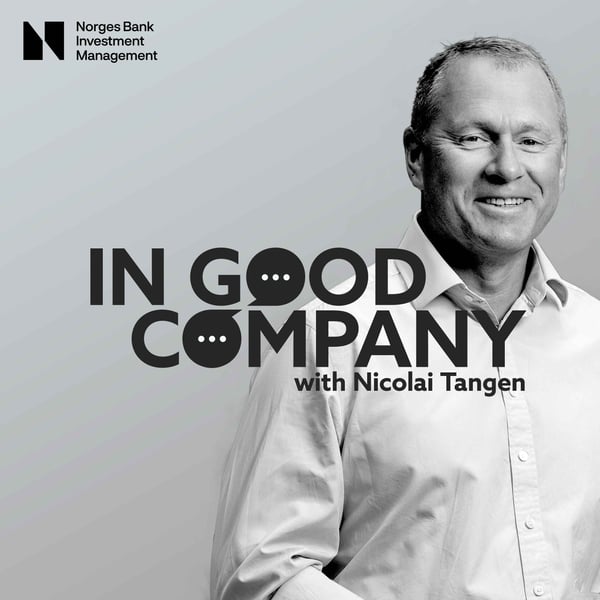Co-Founder of Pixar, Ed Catmull: Fostering Creativity, Learning from Mistakes, and Pixar’s Unique Culture
In Good Company with Nicolai Tangen
Norges Bank Investment Management
4.8 • 186 Ratings
🗓️ 11 September 2024
⏱️ 43 minutes
🧾️ Download transcript
Summary
In this episode, Nicolai Tangen is joined by Ed Catmull, co-founder and former president of Pixar, and author of the highly acclaimed book "Creativity, Inc." Pixar has set the gold standard in animation with groundbreaking films like Toy Story, Finding Nemo, and The Incredibles, earning 27 Academy Awards.
Ed delves into his journey from a technical expert to a cultural leader, sharing his philosophy on creativity, leadership, and the unique culture at Pixar. Discover the secrets behind Pixar´s Brain Trust. The former Pixar president also reflects on his experiences working with Steve Jobs and the profound lessons learned along the way. Tune in to gain valuable insights into managing talent, building creative cultures, and the future of animation and AI.
In Good Company is hosted by Nicolai Tangen, CEO of Norges Bank Investment Management. New episode out every Wednesday.
The production team for this episode includes PLAN-B´s Pål Huuse and Niklas Figenschau Johansen. Background research was conducted by Kristian Haga.
- Watch the episode on YouTube: Norges Bank Investment Management - YouTube
- Want to learn more about the fund? The fund | Norges Bank Investment Management (nbim.no)
- Follow Nicolai Tangen on LinkedIn: Nicolai Tangen | LinkedIn
- Follow NBIM on LinkedIn: Norges Bank Investment Management: Administrator for bedriftsside | LinkedIn
- Follow NBIM on Instagram: Explore Norges Bank Investment Management on Instagram
Hosted on Acast. See acast.com/privacy for more information.
Transcript
Click on a timestamp to play from that location
| 0:00.0 | Pixar has dominated the world of animation with titles like Toy Story, Finding Nemo, The Incredibles, Cars, Monsters, Inc. |
| 0:09.5 | The firm has won 27 Academy Awards, and today we are in the very, very good company with Ed Catmull, |
| 0:15.8 | who started it with Steve Jobs and John Lasseter. Now, Ed also wrote the best book I have ever read about creativity, namely creativity. |
| 0:23.7 | Dot Inc. If you haven't read it, you should run out and buy it. |
| 0:26.9 | So, Ed, what an honor to have you on the podcast. |
| 0:29.1 | It's my pleasure to be here. |
| 0:43.2 | Ed, when you started Pixar, what was your vision for the firm? |
| 0:50.1 | Well, initially, the vision was just to make the first animated film. |
| 1:04.7 | In the process of doing that, I and we transferred from like a technical vision to a management and a cultural vision. |
| 1:07.9 | And it took a while to figure this out. |
| 1:14.0 | It's many years of observing other companies, making mistakes and learning, |
| 1:21.4 | but also finding that managing for me personally was extremely interesting. So I went from being a technical person to a manager, but it evolved over time. No training. It's just all learning as you go, |
| 1:31.9 | observing, and learning from the mistakes. As you observed this and as you worked, what kind of |
| 1:39.4 | cultural vision did you have? Well, I was fortunate in that when I started off in graduate school, my first two |
| 1:47.6 | teachers later received the Turing Award for entirely different reasons. One of them was Alan Kay, |
| 1:56.4 | who pretty much ingrained me the notion that things were going to change at an exponential rate. |
| 2:03.1 | But the other one was from Ivan Sutherland, |
| 2:08.0 | who was basically saying, |
| 2:09.4 | it doesn't matter what your big vision is. |
| 2:11.0 | You've got to solve the problem now. |
| 2:13.8 | So these are the two sides of it. |
| 2:17.1 | But one of the more important things was that when I was in graduate school, I loved the culture. |
... |
Transcript will be available on the free plan in -203 days. Upgrade to see the full transcript now.
Disclaimer: The podcast and artwork embedded on this page are from Norges Bank Investment Management, and are the property of its owner and not affiliated with or endorsed by Tapesearch.
Generated transcripts are the property of Norges Bank Investment Management and are distributed freely under the Fair Use doctrine. Transcripts generated by Tapesearch are not guaranteed to be accurate.
Copyright © Tapesearch 2025.

